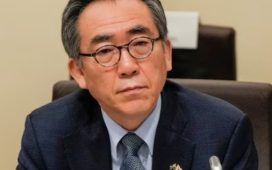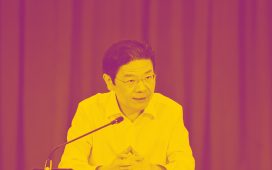On the nights that she manages to fall asleep, Zahra Joya always returns to Afghanistan in her dreams. On good nights she travels back to Bamyan, her home province, with its green mountains and bright blue lakes, or to her parents as they looked when she was a little girl.
Increasingly though, her dreams are full of roadside bombs or men with guns. Some nights, memories of her last hours in Afghanistan play over and over on a loop: the panicked crowds outside Kabul airport, people being whipped and beaten, the sound of her sisters crying.
When she wakes in her small flat in London, where she, three of her sisters and her teenage brother have been living as refugees since their escape from the Taliban in August 2021, Afghanistan is also the first thing she thinks of. Within a few hours of getting up she will be back at her laptop, her waking hours spent reporting on what is happening to the women and girls she left behind.
In the three and a half years since she managed to board one of the last evacuation flights to leave Afghanistan after the seizure of power by Taliban militants, Rukhshana Media – the news agency Joya launched in 2020 to tell the stories of Afghan women and girls – has published hundreds of stories documenting the brutal assault on women’s rights under Taliban rule.
Joya’s small team of reporters, all forced to work in secret, have written stories on the collapse of the healthcare system; girls being banned from the classroom; attacks on female artists, judges, police officers and activists; and increasing food shortages.
“The situation is more desperate every week,” she says. Human rights groups have described the situation facing women in Afghanistan as “gender apartheid”.
“The Taliban just passed a law to stone and execute women in public again for adultery,” she adds. “There is no recourse to justice. They are denying millions of girls an education, an opportunity to work or to travel outside the house. They are trying to eradicate us completely.”
Before she was forced into exile, Joya was striding the streets of Kabul with her notebook, one of the new generation of young female journalists taking enormous risks to carve out a role for themselves in Afghanistan’s patriarchal media industry.
“We had a dream that we were helping build a free Afghanistan where everybody could be who they wanted to be,” she says. “We knew that when the UK and US troops left, it would be a time of great change but I had faith in the future, I never imagined what would happen to us all.”
Now, with the decimation of Afghanistan’s once-thriving media industry, it is down to Joya and other Afghan journalists who find themselves scattered around the globe to keep reporting on what is happening in their homeland.
Joya talks passionately about her belief in journalism to shine a light on injustice, but the grief, trauma and guilt at having found safety while millions of women and girls suffer sits heavily on her shoulders.
She is constantly aware of the miraculous gift of freedom that she and her sisters were given. Her sisters have learned English and are about to start university. “We have been given a second chance at life,” she says. “I cannot imagine the lives my sisters would have if they had stayed. All their potential wasted.”
Yet Joya is aware that all of them are struggling to process the trauma of what they have gone through since they left their family home for the last time in August 2021.
They are, she says, all living “with our hearts divided”. “The Taliban have split our family down the middle,” she says. “My parents and my two older siblings [a brother and a sister] could not come with us. We didn’t have time to really say goodbye. My mother lost five of her children in one afternoon.”
She says it is particularly hard for her teenage brother, who was only 15 when he left his parents behind.
“It is especially sad for my little brother, who has been separated from my mother and has suffered a lot,” says Joya. “He is losing weight and is struggling and I am not his mother. I do what I can but I can’t give him what he needs.”
Joya says her decision to keep running Rukhshana from exile has led to her parents and family being threatened and intimidated by the Taliban in their family home. She says in 2022, her father, a former prosecutor, was arrested, detained and questioned by Taliban militants about her whereabouts. Shortly after, her parents left their home and crossed the border into Pakistan, where they have been ever since.
after newsletter promotion
Joya says they are now effectively stranded and are continuing to receive threats by people linked to the Taliban.
The Pakistani authorities have granted them a succession of six-month refugee visas, but the prospect of their documentation not being renewed and her parents being deported back to Afghanistan is very real. Pakistan has already forcibly deported tens of thousands of Afghan refugees back over the border into Taliban-controlled Afghanistan and, according to human rights groups, is subjecting many others to arbitrary detention and violence.
Joya says her older brother, who is living with their parents in Pakistan, recently disappeared for three days after being detained by Pakistani police, and narrowly escaped being forced back over the border. “When they left Afghanistan they were told that my family is on a blacklist and they should never come back,” she says.
Shortly after they arrived in Pakistan, Joya’s parents applied to the Home Office for a visa to be able to join their other children in the UK. A few weeks ago, she says, their application was denied.
“It is very painful that I could not find a safe place for my family in this vast world. This feeling is devastating and hopeless,” says Joya. “I fear I’ll never see them again and I feel responsible as I know that my journalism has a part to play in their situation.”
Joya’s life is also dominated by anxiety about the safety of the team of journalists reporting for Rukhshana from inside Afghanistan. “Some days I can’t stop checking my phone over and over again to see if something bad has happened,” she says. “Every independent journalist operating in secret in Afghanistan is putting themselves at great risk, but all of them believe very strongly that without journalism there is really no hope that things can change.”
A few months ago, she says, a journalist was arrested by the Taliban and questioned on suspicion of working for Rukhshana. He was in prison for 11 days and only released when some elders from his province appealed to Taliban officials on his behalf. Since then he has left Afghanistan. “The reality is that there is very little I can do if something goes wrong,” says Joya.
The future for Afghan media outlets such as Rukhshana operating in exile is increasingly uncertain.
In 2021, people across the world – many of them Guardian readers – donated more than £180,000 to support Rukhshana’s work. Yet since then Rukhshana, like many diaspora Afghan media organisations, has struggled to secure long-term funding to keep going. Rukhshana Media has now become a registered charity but Joya says that without long-term funding she has no idea how she is going to be able to keep paying her reporters and small editorial team and keep the website operational.
“I try not to think about the future, to just keep going with the reporting and keep going for as long as we can,” she says. “I cannot leave women and girls left there to suffer alone with their stories going untold. They deserve to be heard.”
Support Rukhshana’s work here














